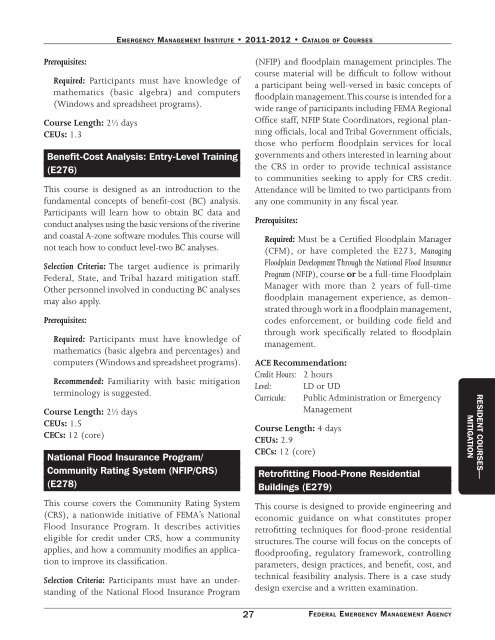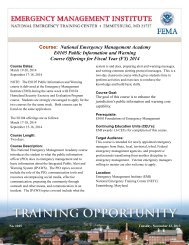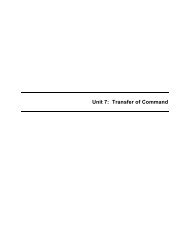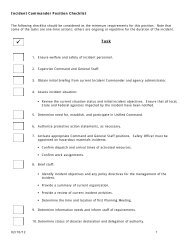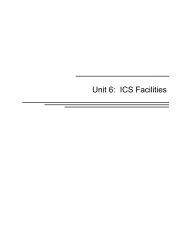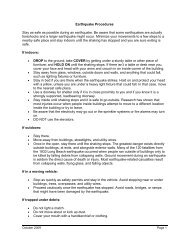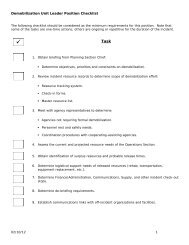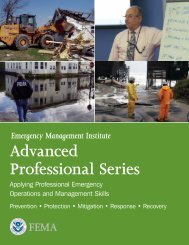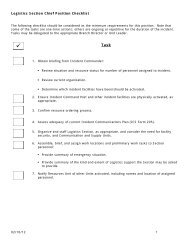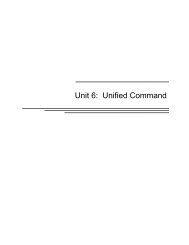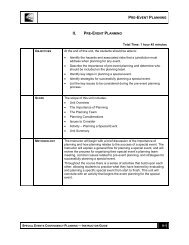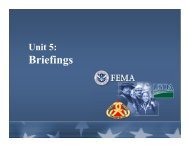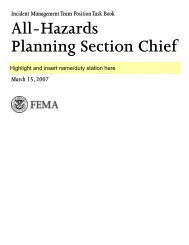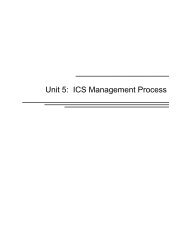EMI Course Catalog - Emergency Management Institute - Federal ...
EMI Course Catalog - Emergency Management Institute - Federal ...
EMI Course Catalog - Emergency Management Institute - Federal ...
Create successful ePaper yourself
Turn your PDF publications into a flip-book with our unique Google optimized e-Paper software.
Prerequisites:<br />
EmErgEncy managEmEnt InstItutE • 2011-2012 • catalog of coursEs<br />
Required: Participants must have knowledge of<br />
mathematics (basic algebra) and computers<br />
(Windows and spreadsheet programs).<br />
<strong>Course</strong> Length: 2½ days<br />
CEUs: 1.3<br />
Benefit-Cost Analysis: Entry-Level Training<br />
(E276)<br />
This course is designed as an introduction to the<br />
fundamental concepts of benefit-cost (BC) analysis.<br />
Participants will learn how to obtain BC data and<br />
conduct analyses using the basic versions of the riverine<br />
and coastal A-zone software modules. This course will<br />
not teach how to conduct level-two BC analyses.<br />
Selection Criteria: The target audience is primarily<br />
<strong>Federal</strong>, State, and Tribal hazard mitigation staff.<br />
Other personnel involved in conducting BC analyses<br />
may also apply.<br />
Prerequisites:<br />
Required: Participants must have knowledge of<br />
mathematics (basic algebra and percentages) and<br />
computers (Windows and spreadsheet programs).<br />
Recommended: Familiarity with basic mitigation<br />
terminology is suggested.<br />
<strong>Course</strong> Length: 2½ days<br />
CEUs: 1.5<br />
CECs: 12 (core)<br />
National Flood Insurance Program/<br />
Community Rating System (NFIP/CRS)<br />
(E278)<br />
This course covers the Community Rating System<br />
(CRS), a nationwide initiative of FEMA’s National<br />
Flood Insurance Program. It describes activities<br />
eligible for credit under CRS, how a community<br />
applies, and how a community modifies an application<br />
to improve its classification.<br />
Selection Criteria: Participants must have an understanding<br />
of the National Flood Insurance Program<br />
27<br />
(NFIP) and floodplain management principles. The<br />
course material will be difficult to follow without<br />
a participant being well-versed in basic concepts of<br />
floodplain management. This course is intended for a<br />
wide range of participants including FEMA Regional<br />
Office staff, NFIP State Coordinators, regional planning<br />
officials, local and Tribal Government officials,<br />
those who perform floodplain services for local<br />
governments and others interested in learning about<br />
the CRS in order to provide technical assistance<br />
to communities seeking to apply for CRS credit.<br />
Attendance will be limited to two participants from<br />
any one community in any fiscal year.<br />
Prerequisites:<br />
Required: Must be a Certified Floodplain Manager<br />
(CFM), or have completed the E273, Managing<br />
Floodplain Development Through the National Flood Insurance<br />
Program (NFIP), course or be a full-time Floodplain<br />
Manager with more than 2 years of full-time<br />
floodplain management experience, as demonstrated<br />
through work in a floodplain management,<br />
codes enforcement, or building code field and<br />
through work specifically related to floodplain<br />
management.<br />
ACE Recommendation:<br />
Credit Hours: 2 hours<br />
Level: LD or UD<br />
Curricula: Public Administration or <strong>Emergency</strong><br />
<strong>Management</strong><br />
<strong>Course</strong> Length: 4 days<br />
CEUs: 2.9<br />
CECs: 12 (core)<br />
Retrofitting Flood-Prone Residential<br />
Buildings (E279)<br />
This course is designed to provide engineering and<br />
economic guidance on what constitutes proper<br />
retrofitting techniques for flood-prone residential<br />
structures. The course will focus on the concepts of<br />
floodproofing, regulatory framework, controlling<br />
parameters, design practices, and benefit, cost, and<br />
technical feasibility analysis. There is a case study<br />
design exercise and a written examination.<br />
FEdErAL EmErgENCy mANAgEmENT AgENCy<br />
RESIDENT COURSES—<br />
MITIGATION


